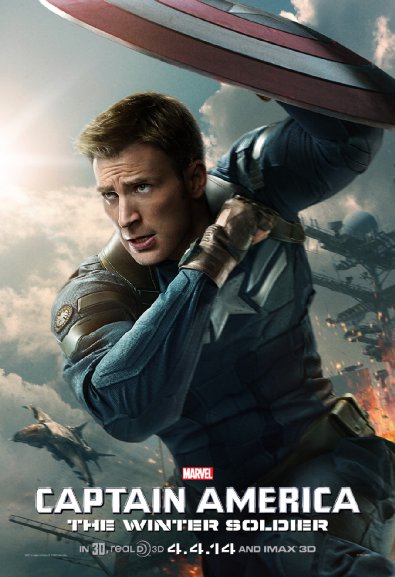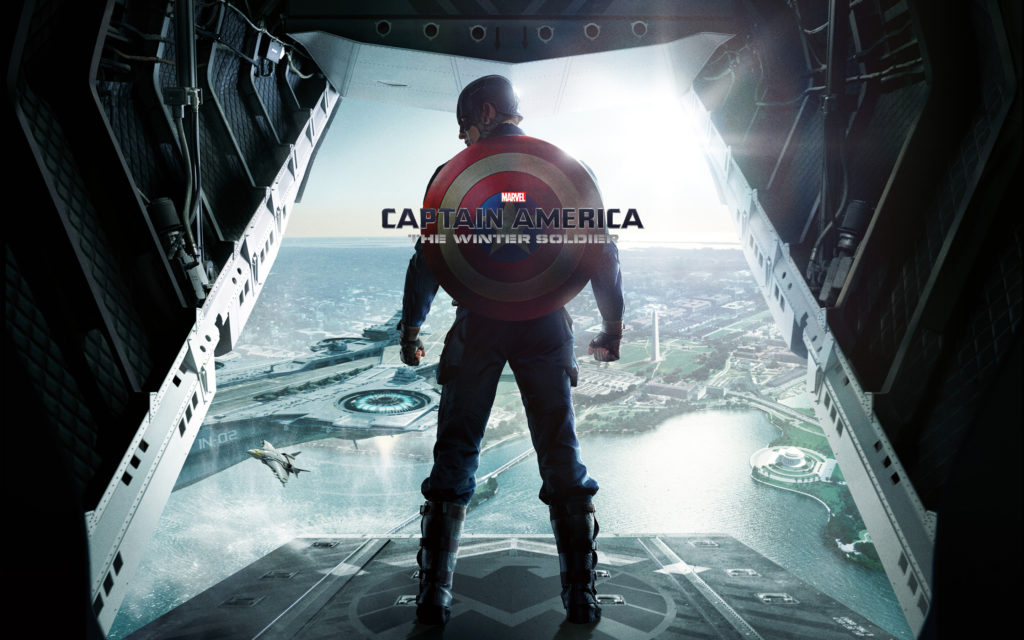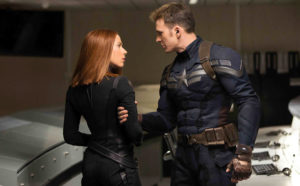‘Captain America: The Winter Soldier’ Fights For True Freedom and Salvation Of Enemies
Two-thirds through Captain America: The Winter Soldier1, the story brings a Big Reveal that about half the audience must have expected given spoilers from the original story, reviews, even the film’s IMDB page. Yet as soon as the story had given this revelation … and slowed for impact … the theater was filled with reactions. People shouted, “Oh!” Hands clasped to mouths. Other mouths swore, the kind of swearing that does not mean, “I am a sinner who wants to sin by saying this” but, “I have been drawn completely beyond myself and now feel overwhelmed by an Other and simply don’t know what to say.”
I’ve never before seen anything like this in a movie theater.
Yes, this was a good crowd, as if the very same crowd with whom my wife and I enjoyed Captain America: The First Avenger (2011). Viewers were captivated by both Captain America stories with an intensity I don’t recall perceiving even among audiences for The Avengers (2012). Why is that? Something particular about this hero’s story has captured fans to the point of making them want to “follow” Cap and his adventures across genres.
Captain America: The First Avenger was set in the hero’s original era, World War 2. The Avengers brought him to the modern age in time to join other heroes and fight an alien invasion. Winter Soldier follows Cap and his new friends on a different kind of journey, weaving a complex and even elegant blend of real-world battles and action-heroics.
Cap: a true hero
 Recently I read that Captain America is the only superhero not to receive a big reboot even in the comic-book story-world. Superman, Batman, Spider-Man, Iron Man, and entire hero universes have been revamped at one time or another. For instance, Superman came to Earth in the 1930s (original story), then again in the 1950s (Superman: The Movie in 1978), then again in the 1980s (Man of Steel, presuming it is set in its release year of 2013). But the story of Steve Rogers, Captain America, must be tied to his World War 2 origins.
Recently I read that Captain America is the only superhero not to receive a big reboot even in the comic-book story-world. Superman, Batman, Spider-Man, Iron Man, and entire hero universes have been revamped at one time or another. For instance, Superman came to Earth in the 1930s (original story), then again in the 1950s (Superman: The Movie in 1978), then again in the 1980s (Man of Steel, presuming it is set in its release year of 2013). But the story of Steve Rogers, Captain America, must be tied to his World War 2 origins.
What does this mean? It means we get a hero grounded in history, or at least an idealized history — a history when right was right (Allies) and wrong was wrong (Nazis). And in an era when some storytellers (with justification) wish to explore the nuances of things, to show that even heroes are flawed and villains have redeeming qualities, Cap is exceptional.
Cap knows this. In Winter Soldier’s story he doesn’t have a single moment of self-aware “angst.” He knows himself and his values even in this strange modern world, but he doesn’t yet know what he can do for it. The iconic super-soldier suddenly finds himself beyond the victory he spent the rest of his 1940s life to win. So from where does the drama come? Not from self-doubt but from the clash of true hero versus flawed world. Other hero stories can well learn the lesson: Not everything needs a Gritty Reboot. This already seems to be a slogan scrawled in large letters on Marvel producer Kevin Feige’s office wall.
Of course with only 2.5 hours, you can’t see everything Steve faces or spell out his code of honor. Instead you must fill that in yourself. Actor Chris Evans doesn’t tell you Cap’s beliefs by pledging allegiance or waving flags; he simply does his job and shows what he said in the first film: “I don’t want to kill anyone. I don’t like bullies; I don’t care where they’re from.”
But let political conservatives who reflexively label this “liberal/Big Hollywood”2 take note: Captain America is on their side. In fact, he and his friends and his story are truly on the side of anyone who fights bullies, no matter where they’re from.
This kind of idealism is shocking and even disturbing, demonstrating the audacity of Cap’s character and narrative. Can there truly exist such a person? Yes, such a Person exists, and Cap might fly His battle flag without knowing it. And when the story takes a strangely-not-predictable heroic-narrative turn toward the other truth — of our hero showing mercy for someone he loves who had become his enemy — I lost it. Already Marvel films reflect John 15:13 when Tony Stark is willing to sacrifice himself to save New York City or even Thor fights to save the planet of the evil Frost Giants from being destroyed. Stark would die for his friends; Thor would die for a race of his enemies. But this is an even more iconic, close-up version of the truth: Cap would give himself for his personal enemy, to save his enemy’s life. More than many other Christ-figure-like heroes, this action shows Him clearest.
Colorful allies
Winter Soldier made me a new fan of returning heroes such as S.H.I.E.L.D. Director Nick Fury and Agent Maria Hill, a new fan of new heroes such as Sam Wilson (the Falcon), and all over again a fan of returning heroine Black Widow. In The Avengers, Fury and Hill served basically and understandably as placeholders; in Winter Soldier both of them, especially Fury, have their own stories to tell and new journeys to show. And Wilson’s story parallels Cap’s and his own more-recent military service naturally leads to the two men’s tangible friendship. From the moment Cap can’t help repeatedly lapping Wilson in the park and Wilson can only laugh at his own comparable physical inferiority, you love this new hero.
But Black Widow nearly steals the show. Gone are my earlier wonderings3 about whether she would be another character who exists to check off a box on a memo and then slavishly follow the whole desperate-sounding “anything men can do women can do better” shooting-up-heroine nonsense. As in The Avengers, neither Black Widow nor her writers are so silly. Instead here is a heroine that anyone can emulate, someone eager to be redeemed. Super-soldier serum may not exist, but Marvel has found the “secret” formula for strong, sexy and capable heroines who are completely unaware of the supposed feminism of the whole thing, and who are human, vulnerable, complex, and not merely sex-objectified.
Pairing Widow with Cap for much of the film was pure genius. You get little romantic wink-winks, but that’s all there is. I love how Cap continues to respect her with such ease as a total equal, yet he also literally shields her from harm as he did in The Avengers. Despite their different pasts — he the truly good super-soldier, she the spy with a dark past — they both dig in and perform their duty against hideous evil as soldiers for a righteous cause.
Real world on super-serum
Several reviewers have remarked how effortlessly The Winter Soldier springs between only slightly updated comic-book tropes, such as decades-old artificial intelligences and a man with a winged jetpack, and sobering contemporary concerns, especially the question of how much freedom people may need to sacrifice in order to avoid harm and live securely.
Given Cap’s statement in the trailers when he sees new massive military ships made to stop threats beforehand — “This isn’t freedom, this is fear” — I thought The Winter Soldier might be loading up with some nuance. I also expected this take in the concurrent Marvel television series “Agents of S.H.I.E.L.D.”, something like: “These are sobering questions, and we will explore them as part of the story but not technically take a side because we’re more interested in how our heroes respond to these challenges.” Well, throw that notion out the window and then jump out after it with a fiery explosion at your heels because that’s not happening. The Winter Soldier takes a side and hoists colors for it, then wraps itself in that flag and fights. How much freedom must you sacrifice for security? Cap says: None. Ever.
Once again the story imitates its hero’s straightforwardness. Cap never varies from his view, never once wonders if freedom is really worth it. So how is that not merely fiction-as-propaganda? Answer: because the audience does wonder. The story challenges Cap’s belief and poses tough questions of other characters: might security matter more than freedom? Then the story answers them not with philosophy telling but heroes showing. Cap will not sacrifice others’ freedoms but will lay down his own life. Black Widow makes an almost greater sacrifice. Nick Fury is brave enough not to flip that switch. And good civilians and S.H.I.E.L.D. agents reject any “I was just following orders” excuses and take their stands.
This heroic inspiration and fleshed-out truth has haunted me to this day. Once again it gives the lie to ignorant “it’s just a movie” cultural-carelessness. It also gives the lie to myths that “Big Hollywood” is only filled with evil double agents. Sometimes they are agents for truth. Sometimes heroes are truly heroic. And sometimes that is all we need.
- The ninth Marvel Cinematic Universe film released in the U.S. on Friday, April 3. ↩
- I tire of the dehumanizing term “Hollywood.” Conservatives, especially if they are Christians, would do well to avoid this kind of subtle verbal “eugenics” against visual storytellers, most of whom see any cultural “agendas” merely as means to tell great stories and/or become rich and famous. ↩
- Sex in the Story 1: Shooting Up Heroine on SpecFaith, Feb. 9, 2012. ↩
































Cap has been my favorite super hero since I saw him in his first Marvel movie. Don’t get me wrong, I enjoy a good anti-hero or anti-hero-turned-hero story as much as the next person. But there’s something so refreshing about a true red-white-and-blue hero who sticks to his values no matter what.
Nah, I just don’t see a Black Widow/Cap ship. I just don’t see her jiving with the sincere type. Me, I’m a sucker for the kind, sincere type. Especially when played by Chris Evans. And Chris Evans’s pecs. And abs.
………….No, I don’t have a Cap fanfic forming in my head. Shut up.
Their relationship is a brilliantly unique one: they’re not quite brother/sister to be sure, but certainly not also Wuv Interests. They’re simple equals on mission.
If you looked closely, you would see that Black Widow wears an arrow pendent around her neck. One could speculate that means a relationship between her and Hawkeye…
I don’t really ship, but if I did I would totes be all over Black Widow/Hawkeye.
I think canon actually had Tony and Natasha together, but the Black Widow winds up betraying the team in Ultimates 2. The cinematic universe just takes the visual style of the Ultimates, but thankfully tosses out the plot.
The best thing about the film: Cap does not descend into the moral relativism of our culture. His truth, honor and integrity remain preserved and ultimately triumph. His dedication to doing what is right against evil never wavers. A rare thing these days out of “Hollywood” indeed. Quite rare. We should all thank God for it.
Agreed. The Captain America films alone prove that even sinful, non-Christian screenwriters live in God’s world and know that the best way to create the best kinds of stories are to use God’s world’s “parts” intentionally, including truth and heroism.
PLEASE write a follow up about Agents of Shield “Turn, Turn, Turn.” Or delegate it to me, and I’d write it myself, because the episode was explosive. There were definitely questions of loyalty, and though it never presumed to answer the freedom/security debate, the continued fact of Coulson’s return made it an underlying issue for the whole show to date.
The most moving part of the movie for me was when, after that incredible, wonderful speech, the betrayed SHIELD agents fought back, knowing they were going to die, and fighting anyway.
That, and that gorgeous Falcon. Oh, my.
I LOVED this movie! This is a great review! Sounds like you had a fun theater audience.
I was really, really impressed with the acting of the Winter Soldier. He could look so souless and deadly one moment and so tormented and broken the next. My heart always goes out to those sorts of characters and he’s one of the best I’ve seen. Really looked forward to that story-line continuing on in future movies. Cap will never give up on him. I really enjoyed that. Too many stories have the girl the answer to the tortured hero’s redemption. I think its awesome that they had Steve start to draw his friend’s true self out. I almost cried.
Sigh…Captain America 3 doesn’t come out till May 2016…
I noticed the same thing about the Winter Soldier, Hannah. It was like some part of him knew he was being controlled and resented it, grieved it. During the up-close shots, that line from Phantom of the Opera ran through my head: “Yet in his eyes all the sadness of the world…”
Totally. Most of the time I think he was just under complete control, but when Steve triggered his inner self, he was desperate to know the truth. That was another scene that super-moving. Him strapped to a chair, surrounded by enemies, almost in tears, knowing he should know more, yet at the same time helpless to do anything. I was like, “Augh, this movie better end well!”
It did. 🙂
Believe me, my sisters and I came home loaded with feels. 🙂
I’ve seen it now.
OUCH
What makes it worse is that I’ve seen Agents of Shield, I knew only what the team knew, and I still thought SHIELD was worth saving.